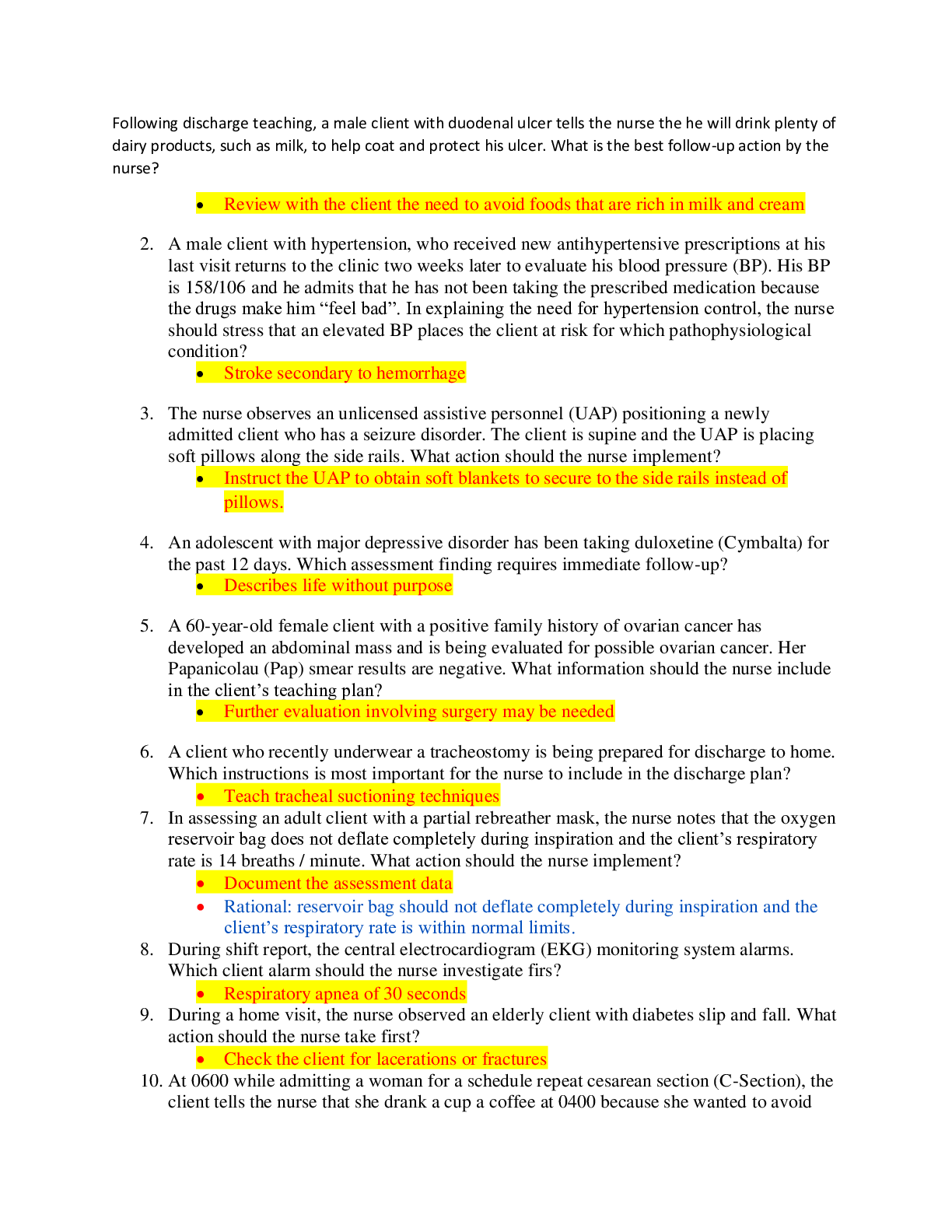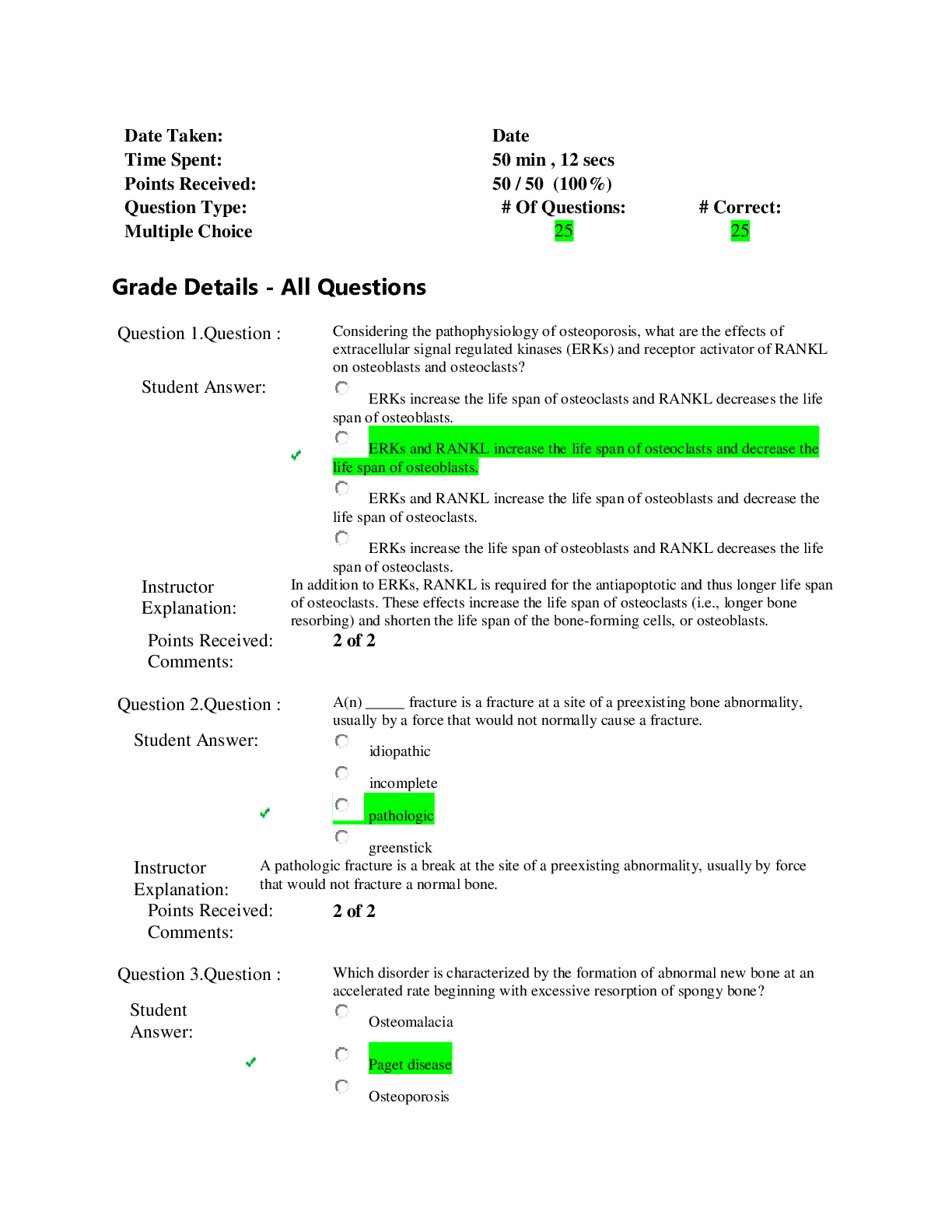*NURSING > EXAM > Chamberlain College of Nursing - NR 508 Final Exam Practice QUESTIONS&ANSWERSs with Rationale latest (All)
Chamberlain College of Nursing - NR 508 Final Exam Practice QUESTIONS&ANSWERSs with Rationale latest update.A LEVEL QUESTIONS.
Document Content and Description Below
Chamberlain College of Nursing - NR 508 Final Exam Practice QUESTIONS&ANSWERSs with Rationale latest update.A LEVEL QUESTIONS. 1. A patient who has diabetes reports intense discomfort when needing to... void. A urinalysis is normal. To treat this, the primary care NP should consider prescribing: oxybutynin chloride (Ditropan XL). This patient is describing urge incontinence, or overactive bladder, which occurs when the detrusor muscle is hyperactive, causing an intense urge to void before the bladder is full. Urge incontinence is associated with many conditions, including diabetes. Oxybutynin chloride, which is an anticholinergic, acts to decrease detrusor overactivity and is indicated for treatment of urge incontinence. Flavoxate is used to treat dysuria associated with UTI. Bethanechol is indicated for urinary retention. Phenazopyridine is used to treat dysuria. 2. A patient reports difficulty returning to sleep after getting up to go to the bathroom every night. A physical examination and a sleep hygiene history are noncontributory. The primary care NP should prescribe: ZolpiMist. ZolpiMist oral spray is useful for patients who have trouble returning to sleep in the middle of the night. Zaleplon and ramelteon are used for insomnia caused by difficulty with sleep onset. Chloral hydrate is not typically used as outpatient therapy. 3. A 5-year-old child who has no previous history of otitis media is seen in clinic with a temperature of 100° F. The primary care NP visualizes bilateral erythematous, nonbulging, intact tympanic membranes. The child is taking fluids well and is playing with toys in the examination room. The NP should: initiate antibiotic therapy if the child’s condition worsens. Signs and symptoms of otitis media that indicate a need for antibiotic treatment include otalgia, fever, otorrhea, or a bulging yellow or red tympanic membrane. This child has a low-grade fever, no history of otitis media, a nonbulging tympanic membrane, and no otorrhea, so watchful waiting is appropriate. When an antibiotic is started, amoxicillin is the drug of choice. 4. An 80-year-old patient with congestive heart failure has a viral upper respiratory infection. The patient asks the primary care NP about treating the fever, which is 38.5° C. The NP should: recommend acetaminophen. Patients with congestive heart failure may have tachycardia from fever that aggravates their symptoms, so fever should be treated. High doses should be given with caution in elderly patients because of possible decreased hepatic function. Antibiotics should not be given without evidence of bacterial infection. 5. A patient who takes levodopa and carbidopa for Parkinson’s disease reports experiencing freezing episodes between doses. The primary care NP should consider using: apomorphine. Apomorphine injection is used for acute treatment of immobility known as “freezing.” [Show More]
Last updated: 2 years ago
Preview 1 out of 17 pages
.png)
Buy this document to get the full access instantly
Instant Download Access after purchase
Buy NowInstant download
We Accept:

Reviews( 0 )
$6.50
Can't find what you want? Try our AI powered Search
Document information
Connected school, study & course
About the document
Uploaded On
Dec 16, 2020
Number of pages
17
Written in
Additional information
This document has been written for:
Uploaded
Dec 16, 2020
Downloads
0
Views
93

.png)






.png)

















